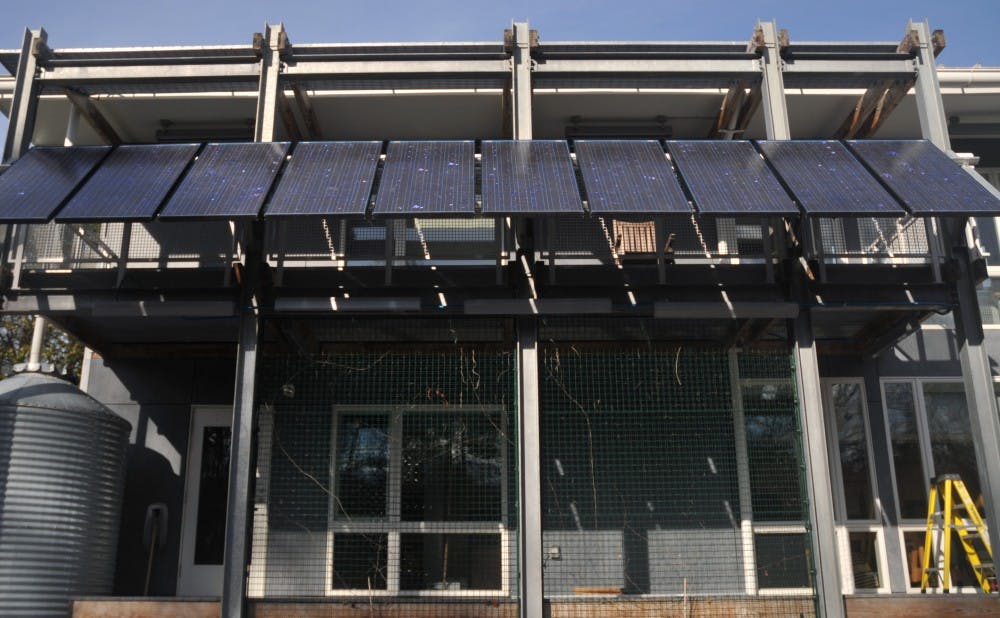According to a report from a leading market analyst, the future of solar energy in North Carolina is looking bright.
NPD Solarbuzz, a solar energy market research and analysis firm, recently ranked North Carolina the second-highest state in terms of solar capacity in the country, losing only to California. The 2013 report marked an improvement from the previous year, when North Carolina ranked fifth nationally in solar energy capacity.
Larry Shirley, the director of operations and planning at the Nicholas Institute for Environmental Policy Solutions, attributes North Carolina’s ascension to solar-friendly policies. He noted specifically the 2007 renewable portfolio standard law that mandates that 12.5 percent of utilities come from renewable energy sources.
“That seemed to ignite solar within the state,” Shirley said, also noting the 35 percent state solar tax credit as a juicy business incentive.
Blair Schooff, a spokesperson for Strata Solar, a leading solar developer and contractor in the state, attributes the rise of solar to a combination of favorable policy as well as efforts at North Carolina’s universities.
“The [North Carolina State] Solar Center’s Database of State Incentives for Renewable Energy is recognized internationally as the resource for renewable energy information,” Schooff wrote in an email Wednesday. “All the major universities have played an active role in raising awareness—whether it's Duke graduating students into the industry, holding industry workshops like the upcoming UNC clean tech summit or even doing substantial solar installs on campus."
Shirley, a founder and former director of the Solar Center, said he was excited about the solar industry’s prospects in North Carolina, citing the influx of solar companies to the state.
“This is a homegrown, state-generated resource,” he said. “It requires business and workers to design, plan and install [the panels].”
Lowell Sachs, the director of communications at the North Carolina Sustainable Energy Association, also said that he was optimistic, but noted that the industry faces some political obstacles.
“[There is] an ongoing debate being waged in the state legislature over whether the productive clean energy policies we have had in place should continue,” he said. “The uncertainty that that debate has created, to some extent, has had a chilling effect on further development.”
Schooff said that Strata Solar has been deeply involved in the politics around solar energy.
“The industry, and our collective bodies such as the NCSEA have done an excellent job of bringing the story of the modern solar industry to the legislature,” he wrote.
Shirley said Strata Solar was important to the success of solar in North Carolina, noting that the firm employs hundreds of people and has turned large tracts of land into solar farms. He added that the main challenge the industry faced was providing a more efficient and less costly form of energy than less-clean alternatives. He noted that even the most efficient solar panels are only operating at 20 to 22 percent efficiency, and that though the price of solar energy is decreasing, it is still more expensive than other energy sources.
Sachs said that North Carolinians need to continue to encourage the growth of the solar industry.
“If you look at the numbers and the benefits that have flowed into the state, they would point toward the fact that [solar-friendly] policies should be continued and welcomed,” he said.
Schooff said that Strata was optimistic that politicians would continue to encourage development.
“When members from both sides of the aisle hear the facts about job growth, investment, the opportunities it provides landowners...mostly everybody becomes a staunch supporter of the industry,” he said.
Correction: Solar Strata is a solar development and contracting company but does not produce solar panels. The Chronicle regrets the error.
Get The Chronicle straight to your inbox
Signup for our weekly newsletter. Cancel at any time.

